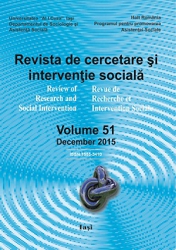ACTUAL TENDENCY IN INSTITUTIONALIZATION OF PATIENTS WITH SCHIZOPHRENIA
ACTUAL TENDENCY IN INSTITUTIONALIZATION OF PATIENTS WITH SCHIZOPHRENIA
Author(s): Andreea Szalontay, Alina Mihaela Pascu, Andreea Teodorescu, Dan Minea, Petru IFTENISubject(s): Cognitive Psychology, Personality Psychology, Health and medicine and law
Published by: Expert Projects Publishing
Keywords: schizophrenia; institutionalization; predictors; poor outcome;
Summary/Abstract: Patients with schizophrenia requiring long-term institutionalization represent cases with poor outcome, often leading to high costs for patients and family and constituting a huge economical burden for society if patients are young. The aims of the study were identification of characteristics and predictors of institutionalization in schizophrenia. Retrospective study of all institutionalized patients with schizophrenia in Brasov County, Romania, with a DSM-IV-TR lifetime diagnosis of schizophrenia institutionalized between 1995 and 2014. Institutionalized patients between 2005 and 2014 (n=172) had lower age (51.15 vs. 57.08, p<0.05) and lower age at institutionalization compared with patients admitted between 1995 and 2004. Lower education level (8.23 vs. 13.22, p<0.05), only one parent, multiple antipsychotics treatments and suboptimal response under first generation long acting antipsychotics are predictors for institutionalization. Our study showed a tendency to institutionalize patients with schizophrenia at the younger age compared with other periods. Early intervention in psychosis, controlled treatment with SGAs should be solutions to avoid institutionalization of young patients with schizophrenia.
Journal: Revista de Cercetare şi Intervenţie Socială
- Issue Year: 2015
- Issue No: 51
- Page Range: 64-71
- Page Count: 9
- Language: English

